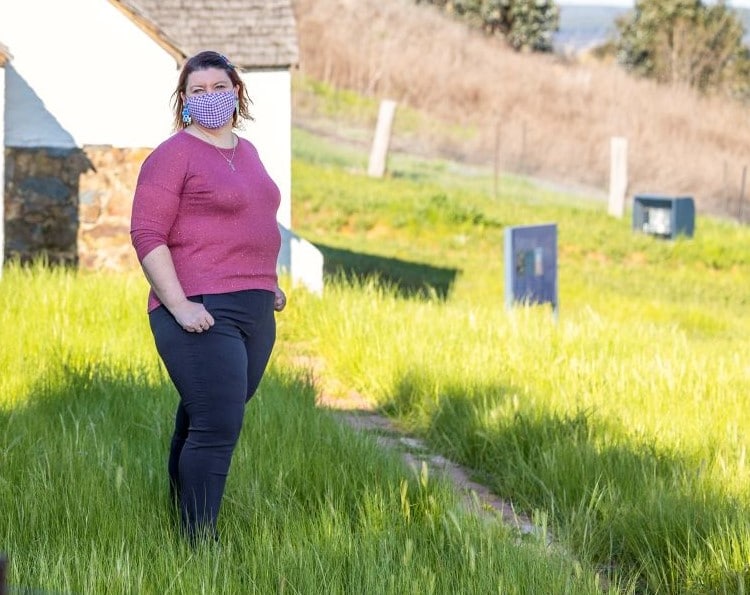There is no shame in asking for help, believes Bianca Rosetti, one of the ACT Mental Health Month ambassadors. She lives with a mental health condition, cares for a teenager with autism, and has chaired the ACT Mental Health Consumer Network since 2017.
Held every year in October, Mental Health Month raises awareness of mental illness, reduces stigma and discrimination against people living with mental illness, and promotes positive mental health and wellbeing in the community.
This year, the theme is ‘Navigating your mental health’: maintaining mental health, supporting each other, and finding resources in the ACT – “Finding the right supports, and the right people to go with you on a recovery journey,” Ms Rosetti explains.
The Mental Health Community Coalition ACT, the event organisers, wanted a theme to go on buses, hence navigation.
“As ambassador, I am the driver going on that recovery pathway, navigating my way through services, but also a guide,” Ms Rosetti said.
“But the driver is not just the person behind the steering wheel; it’s also the motivation to seek something better. An individual needs that drive to seek support and help. It’s important that you don’t do it alone, but have support on that journey.”
How to survive lockdown
Lockdown has made many Canberrans depressed, making this year’s Mental Health Month particularly relevant.
“It’s important to focus on the bigger picture,” Ms Rosetti recommends. “Don’t get bogged down every day checking what’s happening, because that can feel quite overwhelming.”
Day by day, be grateful for what you can do: walking around the lake or your neighbourhood for a couple of hours, driving to the local shops, getting takeaway.
“Take those little wins, go with them, and have a plan for the monumental days.”
Bianca Rosetti
World Mental Health Day will be held on 10 October.
“Try to do something that makes you feel good on that day, just to be aware of mental health conditions for yourself or people in your community.” Ms Rosetti will ask her neighbours how they are, and if they need anything. “Do what you can do to make yourself feel good, but also others around you.”
Focus on 15 October, the day the government has said lockdown will finish, and how you will celebrate – perhaps by going to the park with friends, and having a cup of coffee or a glass of champagne. If lockdown extends beyond that day, still celebrate – in a safe way – what you were going to do.
“It gives you something to hope for, and look forward to.”
Seek help early for mental health
Ms Rosetti advocates for prevention health and wellbeing. “I strongly believe in seeking help when you’re not in crisis,” she said.
But finding that help is not always easy. There are, she said, a lot of services in the ACT that provide good support, but not many people know of them. Some early intervention services have long wait times, and people who need that support can end up in hospital.
“As a community, we need to support them in the mild to moderate phase,” she said.
Other services, she states, require patients to have been in the hospital emergency department or adult mental health units.
“So you have to reach that crisis before getting help,” Ms Rosetti said. “I would like to flip that around, and say: ‘OK, your GP has noticed you need support; let’s get you that support now, so you don’t have to present at the crisis stage, and we can get you the support you need as soon as possible’.”
Don’t be afraid to ask for a second opinion from your doctor, she urges.
“Professionals aren’t the experts. You … are the expert in your health; if you feel that something is not right, keep going until you get that answer.” A GP might tell his patient: ‘You’re OK, toughen up, take a Panadol, and tomorrow you’ll feel better’. The patient might think their doctor hasn’t listened, and there’s nothing wrong with them. “They are being misguided by someone who they feel should have supported them,” Ms Rosetti said. Find another professional; visit a walk-in centre; keep calling around until you get what you feel need, she recommends.
As chair of the ACT Mental Health Consumer Network, Ms Rosetti represents the consumer perspective to policymakers in ACT Health.
“Sometimes I think policymakers get caught up in their policymaking, and they forget that what they’re doing is actually going to impact the people using the services.” For instance, mental health units in the expanded Canberra Hospital might suit staff – but can patients find them, and are they private enough?
Other jurisdictions provide more peer support, she believes; the ACT is “a bit behind the eight-ball” in getting key workers into the community, into services to support people to prevent crisis. The ACT could also learn from what other states and territories do.
“Canberra sometimes can be very siloed. They want to be proud to say that they do things themselves – but we really need to work in collaboration with other states.”
What the ACT does well is education and reducing stigma. “It’s not 100 per cent, but it’s getting there,” Ms Rosetti said.
Mental Illness Education ACT (MIEACT) teaches high school students about mental health, from exam stress to bullying (Ms Rosetti delivers those programs); runs an online program for primary school students and their parents or carers; and educates workplaces.
The Youth Aware of Mental Health (YAM) program, run in conjunction with ACT Health and the Black Dog Institute, gives a more in-depth look at mental health, from stress to depression and suicidal thoughts.
For more information about Mental Health Month, visit www.mentalhealthmonthact.org.
Get all the latest Canberra news, sport, entertainment, lifestyle, competitions and more delivered straight to your inbox with the Canberra Daily Daily Newsletter. Sign up here.



